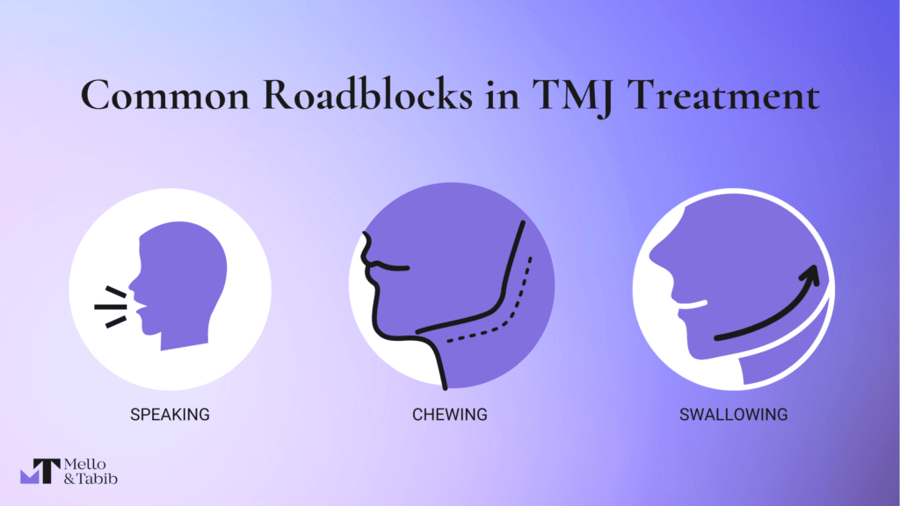Roadblocks in TMJ Treatment: Solutions and Strategies
January 1st, 2024
4 min read

If you’re struggling with TMJ (Temporomandibular Joint) disorders, you’re likely all too familiar with the discomfort and inconvenience they bring into your daily life. These disorders can manifest as pain in the jaw joint, difficulty chewing, or even a persistent aching that radiates throughout the face and neck. The road to relief isn’t always straightforward, and encountering roadblocks during TMJ treatment can be a significant source of stress and uncertainty.
At the core of any effective TMJ treatment lies a deep understanding of the intricacies of the jaw and the conditions that affect it. Dental professionals, like Dr. Tabib and Dr. Mello, who have experience in TMJ disorders bring years of dedicated study and experience to the table, offering tailored solutions that aim to alleviate your unique symptoms.
This article delves into common obstacles faced during TMJ treatment and offers insights into overcoming them.
Identifying Common Roadblocks in TMJ Treatment
TMJ disorders are notoriously complex, partly because the jaw joint is involved in various essential functions such as speaking, chewing, and swallowing. When treatment begins, patients may face several challenges.

Despite ongoing treatment, symptoms such as pain, headaches, and stiffness may persist, leading to frustration and discouragement. This continuous discomfort can make daily activities, which most people take for granted, a grueling ordeal. The constant presence of pain may affect one’s mood, relationships, and overall quality of life.
Patients also have experienced negative reactions to certain therapies, which can exacerbate their condition rather than improve it. This setback can be disheartening, especially when the intention is to heal, not harm. Such adverse effects can range from increased discomfort to new symptoms, casting a shadow of doubt over the chosen treatment path.
Address Persistent TMJ Symptoms
For those who find their symptoms persisting, the key is to reassess and adapt the treatment plan. This could involve:
- Advanced Diagnostics: Utilizing cutting-edge imaging techniques, such as X-rays or 3D Scans of the jaw, to better understand the structural issues at play.
- Personalized Therapy Adjustments: Altering therapeutic approaches to better suit the individual’s specific condition and response to treatment.
Adverse Reactions to TMJ Therapies
If adverse reactions occur, it’s essential to pinpoint the cause and adjust accordingly. Solutions may include:
- Holistic Treatment Options: Incorporating alternative therapies such as acupuncture or chiropractic care that may offer relief without the side effects of more conventional treatments.

- Medication Management: Reviewing and revising any prescribed medications to ensure they are providing benefits without detrimental side effects. For example, muscle relaxants or botox treatments can be used for short-term acute problems and long-term chronic conditions that aren’t responding to other treatments.
It’s a reminder that TMJ therapies are not one-size-fits-all and that each individual’s journey to recovery may require a unique and carefully monitored approach to avoid these unintended roadblocks.
When Surgery Is a Consideration in TMJ Treatment
Surgery is often viewed as a last resort in TMJ treatment, but for some, it may be a necessary step to find relief. Understanding when and why surgery might be recommended is crucial.
Severe Joint Damage
Severe joint damage in TMJ disorders can be particularly challenging. When the TMJ is significantly damaged, it may not respond to the usual non-surgical treatments like medications, mouthguards, botox, orthodontics, or physical therapy. In such instances, surgical intervention may become the most viable option to consider. This level of intervention is aimed at restoring function, alleviating pain, and improving the quality of life. It’s a considerable step that requires thorough consultation with specialists to ensure that the benefits outweigh the risks.
Failure of Conservative Treatments
When the less invasive routes to treat TMJ disorders don’t lead to the relief expected, it can be quite disheartening. Patients who find themselves in this situation have often tried a variety of methods—such as oral splints, physical therapy, botox, orthodontics, and medications—to no avail. If these gentler approaches don’t bring the improvement needed, surgery may come into the conversation as a more definitive solution. It’s a decision that carries weight, as surgery aims not just to relieve symptoms but to address the root cause of the dysfunction. For those who have walked the long road of conservative treatments without success, surgical options may open the door to a more lasting resolution and the chance to regain the quality of life that TMJ disorders have compromised.
The Role of Expert Surgical Consultation
Before proceeding with surgery, a thorough consultation with a TMJ specialist is vital to ensure it’s the right choice for your situation. This involves evaluating the potential benefits of surgery against the risks and possible complications. Take the time to develop a surgical plan with your dentist that is tailored to the individual’s anatomy and treatment history.
Lifestyle Modifications to Support TMJ Treatment Success
The journey to overcoming TMJ disorders isn’t limited to clinical treatments. Lifestyle changes like dietary adjustments and stress management play a pivotal role.
Dietary Adjustments
Making changes to what you eat can play a big part in managing TMJ disorders. When your jaw is giving you trouble, switching to a soft food diet can help a lot. This means choosing foods that don’t make you work too hard to chew, giving your TMJ a break and a chance to heal. Think of it like putting a cast on a broken leg—eating softer foods acts as a support system for your jaw. It’s a simple yet effective way to lessen the daily strain on your TMJ, and it can make a significant difference in your healing journey, making the process a little easier and a lot less painful.
Stress Management Techniques
When stress levels rise, it’s not uncommon for tension to build up in the jaw, which can worsen TMJ discomfort. Finding ways to relax and release that tension is key. Activities like yoga or meditation can be incredibly helpful. They work by calming the mind and, in turn, relaxing the muscles in the jaw. It’s similar to releasing a tightly wound spring; as the tension dissipates, the symptoms often improve. Regularly practicing these techniques can create a sense of ease that not only benefits the jaw but also contributes to overall well-being, helping to keep TMJ symptoms in check.
Comprehensive Care for TMJ Disorders in New York City
For those seeking TMJ treatment in New York City, the landscape of care options is diverse and advanced. Clinics in the city offer a range of services, from state-of-the-art diagnostics to innovative treatment modalities, all aimed at providing relief to TMJ sufferers.

If you’re navigating the complexities of TMJ treatment and looking for expert care, remember that help is close at hand. NYC Smile Design offers personalized consultations to explore your symptoms and find a path forward. Don’t let TMJ discomfort dictate your life; take the first step towards a pain-free smile and schedule your consultation with NYC Smile Design today. Your ideal treatment plan awaits, tailored just for you, right here in the heart of New York City.
Topics:

